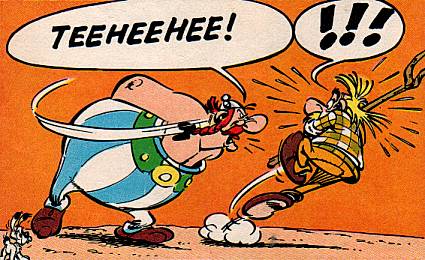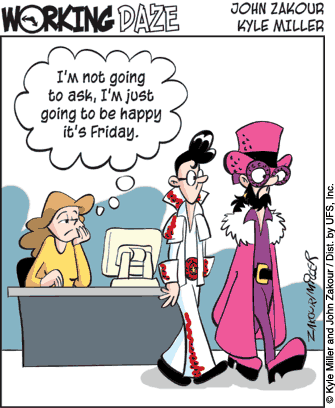I seem to have erred.
/\/\/\/\/\/\/\/\/\/\/\/\
Somehow, saying “thank you” actually thanks a person. That has long mystified me. If you are as confused as I am by this and want to deprive the expression of any grattitude a thankee might potentially receive from it, you should consider, as I have done lately, prefixing “thank you” with “I.” So easily transformed is “I do so appreciate you enriching my life with your deeds!” into “our committee has decreed your action adequate to merit this brief personal notice” that it scarcely seems such a transformation is possible. And even though I included the word “appreciate” in the more effective hypothetical thank, I have discovered that actually saying “I appreciate” something is worse and less human than either thank form. “I appreciate it” always seems like it will be or should be followed with “but…” and a positivity negating agent. It is like hearing of a humorous situation and remarking “that’s funny.” You might as well not acknowledge it at all!

On a related note, when I hear of a humourous situation I generally do not acknowledge it at all. Even when I consider them to be that. I would feel incredibly foolish to suddenly resort to the petty vice of “lol” after eleven years of avoiding it, but I also can’t ever bring myself to type “ha ha ha ha” in anything but an ironic or vindictive sense. The same sense one speaks “ha ha ha ha” in.

Such as:



It just seems weird to represent actual laughter with. And the popular alternative “I had to laugh at this” comes through as insincere and excessively formal. I already laughed, if indeed I did. I probably stopped before I began wondering what to say. Even in actual mouth conversation I tend to suppress mirthful outbursts. How can I tell people I don’t hate them? People are less likely to notice you aren’t laughing if you follow up someone else’s funny thing with your own funny thing. And so my only available path of action is to attempt to top everyone else’s jokes, always, forever, which is a thing that is not actually possible. And if it was people would resent it. Fortunately, it is plenty resentable anyway. I ought to know: I have sent it many times.



Pigbuster sez:
I have found that in most internet situations in which a short reply to something humorous is allowed, “heh” is sufficient. If anything makes me laugh harder than that which “heh” indicates, I usually say something such as, “oh god, I can’t stop laughing”. Not perfect, but mentioning a certain deity in this kinds of thing tends to give it more weight.
On that note, the last image in this article is one of the best things I’ve seen all week. Of course, the sad thing about humorous out-of-context images is that after the first viewing, they’ll never be as funny again. It’s quite tragic, really. Not really.
Fleeplezeep sez:
You are probably right.
Heh I will consider, but this was really more about the practice itself, of typing out laughter, than the particular variety of laughter which is typed out. Or it was supposed to be. By now I have no idea.
Hellen CLARK sez:
Good work on your blog, I love to see the effort and I am just saying keep up the good work.
Fleeplezeep sez:
I hate you, Hellen CLARK.
A stool pigeon sez:
The “thank you” bit is paralleled in German, with “danke” being short for “ich danke dir/Ihnen”, although one hears the full form a wee bit more frequently than in English. The same is true of “bitte”, being short for “ich bitte dir/ihnen” (“I bid you”). English “please”, on the other hand, is scarcely ever thought of as deriving from “If it please you”, and indeed the extended phrase (when used at all) is almost always delivered in a sarcastic manner. What’s more, the full version doesn’t even work in some situations where the simple “please” can be used; while there’s nothing wrong with an emphatic “I bid you!” when either reprimanding or begging, an emphatic “if you so please!” generally sounds downright weird, if at all syntacticlly sensible. And let’s not even get started on “No, thank you”, which, while perfectly reasonable in written form, is almost invariably spoken as though the speaker wished to indicated that You is not being thanked rather than the intended declining something but appending a you-thanking to the statement in order to soften the effect.
But I suppose it is the nature of such pressed-together words and phrases when used in conjuction so frequently to blur their original meanings. After all, “already” does not mean completely prepared, “awful” does not [normally] mean full of awe, etc., &c. With abbreviated words and phrases the process likely becomes even easier, speakers coming to regard them as unique entities in their own right rather than the simple sum of their component words. But I guess that’s one way new words are created.
Fleeplezeep sez:
I do have a tendency to find an issue, childishly taunt it and run away without truly knowing what was going on. That is all I am equipped to do sometimes.
I had not considered that “thank you” already was an abbreviation of a more sensible yet more laborious phrase, which surely contributed to my trouble. I shall then not fault abridged editions for existing, but they do torment me so.
I would love a new word which I could use in “thank you”‘s stead, one which does not remind me of an old phrase which seems like it should mean a different thing. “Please,” thankfully (I am filled like a thank!), is not one I had thought of, and I hope not to start, if it will prevent future entries of this one’s sort. “Thanks” is no good, because it does remind me of a phrase and does not seem like a statement. I want to respond to it with “welcomes.” This, assuming the thanks are welcome. I do not know what the thanks intend, only that they exist. I do not know how many thanks there are. What is the value of one thank? And so, while stricken with all this I recently dropped an “I thank you” on someone and almost immediately wanted to die. In full what I said was “I thank you for thinking of my occasion!” with a creepy exclamation point at the end. It is this sort of grattitude abuse, and the mental processes which lead to it that make people not want to think of my occasions.
Drinky sez:
I type out “ha ha ha ha” (or variations thereof) in online conversations because (a) I pretty much cannot stand “LOL” (b) the effort involved connotes sincere amusement and not a knee-jerk “I see you were trying to be funny” reflex and (c) the variations allow me to express exactly how funny I found something.
Although, yes, I have had to clarify for people that no, “ha ha ha ha” meant I was actually chuckling (appreciatively, not maliciously) on my end.
Fleeplezeep sez:
But then… what do you do if you need to come across as mean-spirited? Spelling out “Moohoohuhuhuhahahwhawhahahaaaa” surely would take too long!
Pigbuster sez:
I tend to go for “fufufu” when I need an evil laugh. You can find it in your local Japanese Role-Playing Game. “Mwahaha” is also sufficient, but it uses two letters other than the ones that can be alternated in rapid succession. “Ahaha” is pretty good, too, but it lacks the edge a sinister laugh truly needs. “Wahaha” is useful for Wario impressions.
Choose wisely.
Fleeplezeep sez:
I always (ehhh, since 1994) liked g’fahaha, the Ultros laugh.
A[nother] sign of how behind I am on video games: I don’t even know what Wario’s voice sounds like these days, unless it’s by the same person who provided it in those old game-boy title advertisements, which I doubt. I could find that out easily enough, but if I write this comment as a mere summary of my reaction, as it is suggested I do with laughter, then I do not know.